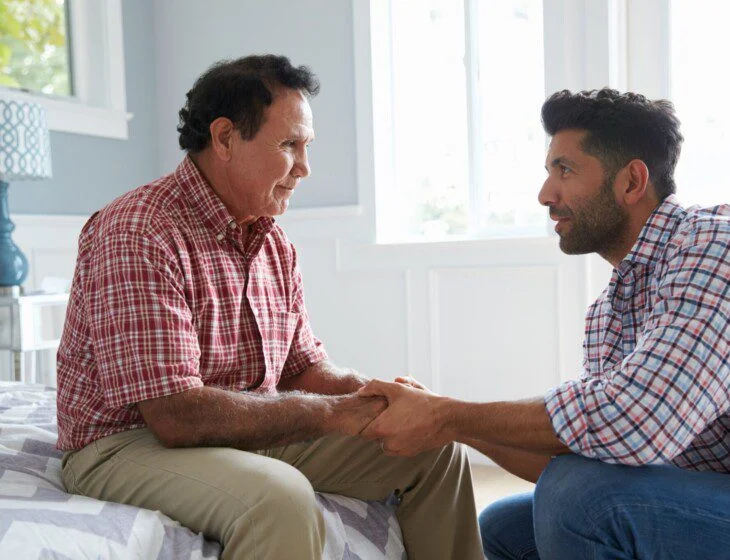Learning that a loved one has Alzheimer’s disease or another form of dementia can be devastating. Accepting the diagnosis is often a very hard thing to do and it takes time. Denial and fear are normal reactions, often followed by grief. As a potential caretaker of someone with dementia, it is extremely important to give the diagnosed person time to process the news.
Before we get into how a caretaker can support a loved one showing signs of Alzheimer’s, it is first helpful to understand what the early signs and symptoms of the disease actually are.
Early Signs & Symptoms of Alzheimer’s
Scientific research into the complex brain changes involved in the onset and progression of Alzheimer’s disease is ongoing. The first symptoms of Alzheimer’s tend to vary from person to person, which can make early detection of the disease difficult. The Alzheimer’s Association has identified 10 early signs and symptoms of Alzheimer’s that signal a person should be evaluated by a doctor. Memory loss that disrupts daily life is typically one of the first signs of dementia.
Alzheimer’s disease progresses in several stages: preclinical, mild, moderate and severe. The majority of people diagnosed with Alzheimer’s have the late-onset variety where symptoms first appear in their mid-60s. Signs of early-onset Alzheimer’s begin between a person’s 30s and mid-60s. This type of Alzheimer’s is much less common and genetics sometimes plays a role.
Helpful Ways to Support Your Loved One
There are many helpful online resources available for those who are beginning the journey of supporting a loved one living with Alzheimer’s or another type of dementia. The Alzheimer’s Association, which shares a wealth of information for caregivers on its website, is a great place to start.
Caregiving in the Early Stages of Alzheimer’s
The early stages of Alzheimer’s can last for years. This stage not only impacts the person diagnosed with the disease, but it also affects everyone who loves and cares about them. As a caregiver or care partner, the most important thing you can do is allow yourself and your loved one time to process the news and transition to the new situation. Consider connecting with your local chapter of the Alzheimer’s Association for more information on support groups. Learn all you can about your loved one’s diagnosis and how you can best support their health.
Maximizing independence and helping the person with dementia live well should be your primary objectives. That includes encouraging physical activity and creating a healthy daily routine.
Don’t Forget to Take Care of Yourself
Becoming a caregiver for someone you love can be both rewarding and stressful. Build a support system of friends and family that can help out when you need a break. Practice healthy habits and take the time to rest when needed. Stay active and involved in the activities you enjoy. Taking care of yourself will ultimately allow you to be a better caregiver for your loved one.
Alzheimer’s Care Options In Austin
There are a number of support options available to help you provide the best care possible for your loved one. These include temporary, part-time and full-time care options.
Adult Day Centers
Adult day centers offer people with Alzheimer’s and other types of dementia the opportunity to be social and participate in activities in a safe environment. This arrangement is particularly well suited to someone living with Alzheimer’s who has a primary caretaker. An adult day center not only offers the person with Alzheimer’s a chance to socialize, but it also allows the caretaker time to work a day job, run errands or simply rest and recharge so that they can provide better care.
In-Home Care
In-home care is an option for someone with Alzheimer’s or another type of dementia that wishes to stay in their home for as long as possible. Caregivers who provide in-home care services are often referred to as personal care assistants or home health aides. These caregivers may work full-time or part-time to help the person living with Alzheimer’s complete activities of daily living.
Residential Care
Eventually, a person living with Alzheimer’s or dementia may need more care than can be provided at home. Some people — whether they live alone or with loved ones — may even prefer to move into a communal living environment. Residential care facilities may include retirement housing, assisted living, skilled nursing or memory care communities. Continuing care retirement communities (CCRCs), such as Querencia at Barton Creek, which provide a full range of care for patients with Alzheimer’s and dementia, including Memory Care, are growing in popularity.
Respite Care
Respite care is an option for caregivers who need a break, whether it be time to take an extended vacation or if there is an emergency situation that prevents them from providing the adequate level of care for a person with Alzheimer’s. Respite care can be provided at home or in a care setting, such as an adult day center or residential facility. The Alzheimer’s Association recommends that you try respite care providers out in a non-emergency situation first.
Querencia’s Memory Care Services
Querencia at Barton Creek takes an individual approach to care for our residents living with Alzheimer’s or other types of dementia. We encourage our Independent Living residents who are diagnosed with Alzheimer’s to create routines based on our programming calendar. As a CCRC, we are able to offer different levels of care to our residents as their needs change. Our trained memory care professionals work closely with loved ones and family members of residents living with Alzheimer’s to provide a personalized plan for each resident that supports their health.
Showing Support for Spousal Caretakers
Querencia recognizes the stress spousal caretakers experience while providing care for their loved ones and the toll it can take on physical and mental health. Social Services Director Ashley Brorby leads a year-round spousal support group for our resident spouses or significant others who are or have cared for someone with Alzheimer’s or dementia. The group meets once a month and those interested can reach out to one of our team members for more information.
If you’d like to learn more about Querencia at Barton Creek or the health and wellness services we provide to our residents, we are more than happy to share. Contact us today!


